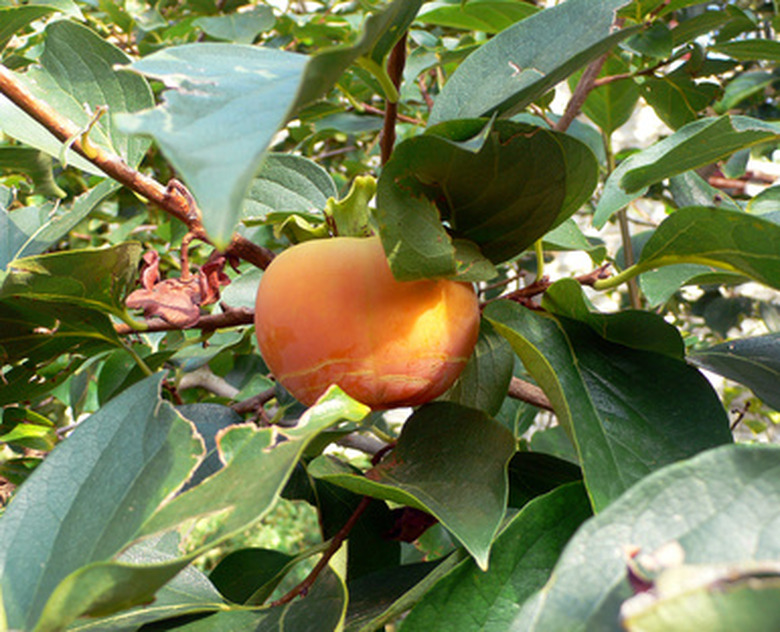Fruit Trees In Tennessee
Growing seasons throughout Tennessee are as varied as the Volunteer State's topography. Memphis gardeners in the southwestern part of the state have up to eight months to enjoy their hobby. Residents of eastern Tennessee's Great Smokies have closer to four months. The fruit trees that will grow in Tennessee are not limited to natives that are adapted to conditions in their areas. Several cultivated fruit trees may also grow well in your Tennessee garden.
Persimmon
Persimmon (Diospryos virginiana) trees are hardy throughout Tennessee. They grow wild in abandoned fields and dry woodlands, reaching between 15 and more than 100 feet high depending on location. The trees' spreading, drooping branches produce clusters of yellow to yellow-green, bell-shaped flowers between May and June. Dark green leaves become yellow in autumn, when persimmon fruit ripens to bright orange. Persimmons require a male and female tree for cross-pollination.
- Growing seasons throughout Tennessee are as varied as the Volunteer State's topography.
- Memphis gardeners in the southwestern part of the state have up to eight months to enjoy their hobby.
Tasting similar to dates, persimmons feed birds, deer, raccoons, opossums and other small mammals. They also make good puddings and cakes. Plant trees, advises the Lady Bird Johnson Wildflower Center, in part shade and moist, acidic soil. They tolerate a range of soils including sand, loams and clay. (Reference 2)
American Plum
A small, spreading tree reaching up to 35 feet, American plum (Prunus Americana) grows wild along Tennessee's stream and woods and in mountain pastures. The black-barked trees are hardy through the state. Their crooked trunks have horizontal branches laden with eye-catching clusters of fragrant white flowers in April or May. Green leaves that become bright red or yellow in fall follow the flowers. The tree's fruit ripens to red in August. Edible right off the tree or in preserves, they also feed birds. Spreading roots make these trees effective for erosion control. Plant this tree in sun to partial shade and moist, slightly alkaline or acidic, well-drained loam. Except for the fruit, all parts of American plum are toxic if ingested.
- Tasting similar to dates, persimmons feed birds, deer, raccoons, opossums and other small mammals.
- The black-barked trees are hardy through the state.
Liberty Apples and Moonglow Pears
The University of Tennessee Extension recommends several fruit tree cultivars for Tennessee gardeners. Dwarf, disease-resistant Liberty apple trees (Malus 'Liberty') stands 8 to 10 feet high and wide and grows throughout Tennessee. Its fragrant, white May blooms attract hummingbirds and butterflies. Full-sized, green-and-red apples ripen in September. The trees prefer well-drained, deep, loamy soil in full sun. Moonglow pear (Pyrus communis 'Moonglow') is another dwarf fruit tree that grows up to 10 feet high and wide. It has dense clusters of creamy flowers in April or May, with yellow-and-red pears ripening in the middle of August. Moonglow likes well-drained, loamy sand or clay soils and full sun. Spring frost may damage its buds.
- The University of Tennessee Extension recommends several fruit tree cultivars for Tennessee gardeners.
- Moonglow pear (Pyrus communis 'Moonglow') is another dwarf fruit tree that grows up to 10 feet high and wide.
